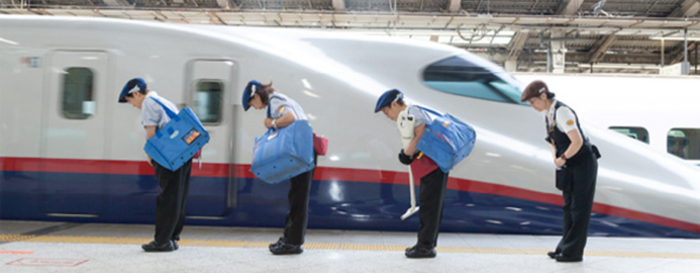Why Are We Slow Learners?

The Japanese high-speed trains are legendary, as well they should be. They’re very fast, of course, and they also run on time. But they are also spotlessly clean. And why shouldn’t they be with cleaning crews that zoom through the cars of an arriving train, removing every tiny bit of trash, running a portable vacuum over the carpeting, and exiting onto the platform in time to bow in welcome to the boarding passengers.
Modern, clean equipment, that runs almost silently at high speeds with no sway, no bumps, and almost no track noise. Oh, yes … and with an impeccable safety record.
And this just in:
A Japanese railroad, the Metropolitan Intercity Railway Company, recently put up a notice on their web site apologizing for ”the severe inconvenience imposed upon our customers.” Apparently, about a week ago, train #5255, a Tsukuba Express train, arrived at Minami-Nagareyama station exactly on time at 9:43:40 in the morning. The train’s scheduled stop at that station was supposed to be exactly one minute long, but the train pulled out of the station at 9:44:20, a full 20 seconds ahead of schedule.
According to the railroad, no one missed the train because of this gross infraction, but apparently that’s beside the point. “On time” means exactly that, not 20 seconds early. Or late either.
This marvelous system is simply a fact of life in Japan. It’s taken for granted that the trains will be fast, frequent, safe, quiet, comfortable and punctual. Meanwhile, here in the U.S. of A., we’re still arguing about whether or not passenger trains are a good idea. How embarrassing!



Read behind the lines in Rule Five. A train may not leave a station before its timetabled leaving time. Perhaps the public apology is a way of not having to publicly call out a crew that should be called before the division superintendent privately.
Yes … but 20 seconds??
Once upon a time, New York Central’s suburban trains had timings to the half-minute in the employee timetables. Yes, the operators of extra trains and the foremen of maintenance crews have to clear scheduled train timings by five or ten minutes, depending on the Book of Rules.
And yet, if the Division Superintendent calls in the crew that left 20 seconds or 30 seconds early for a heart-to-heart about operating safely, that might be one way to prevent more egregious lapses, such as the overlaps block operators in Germany and Italy permitted last year.